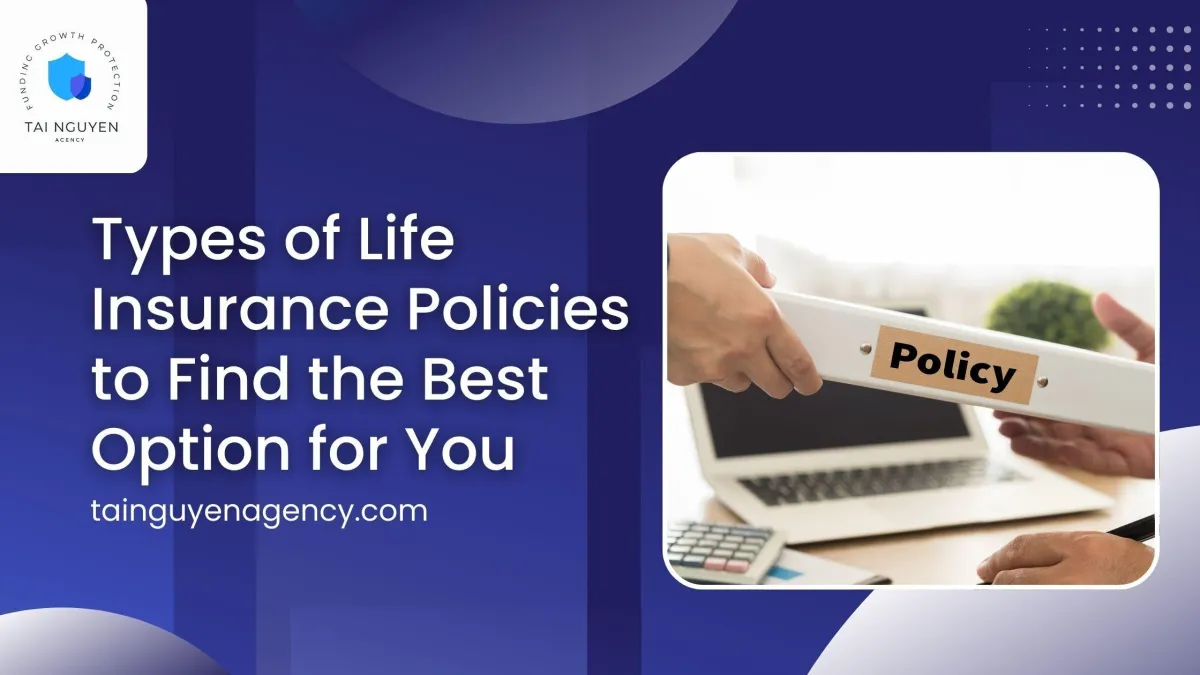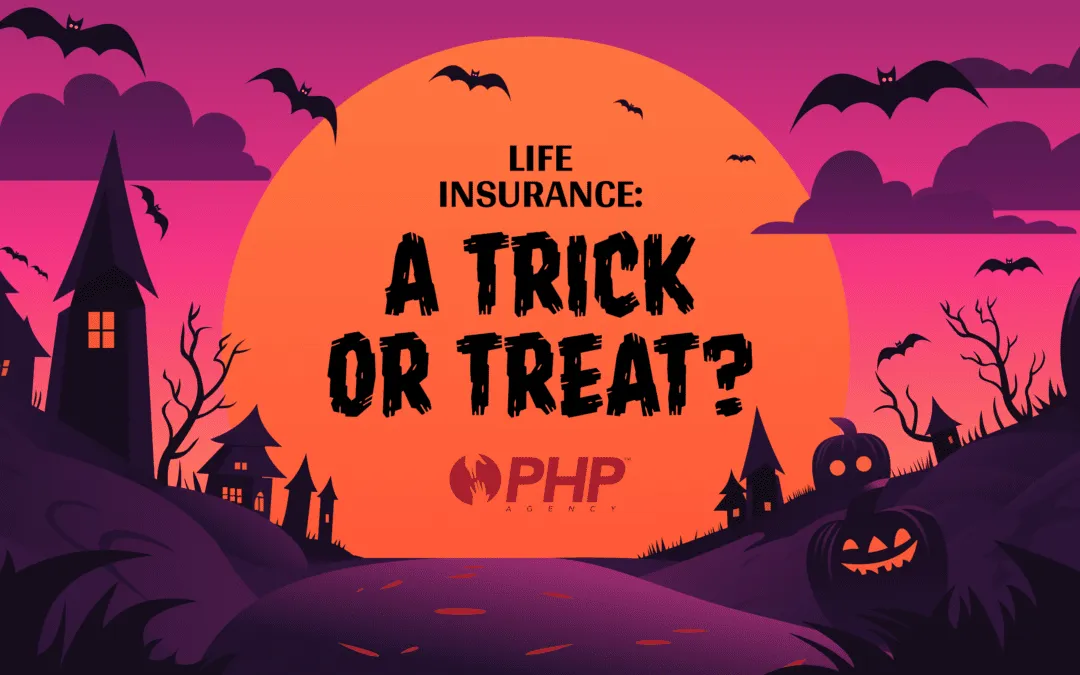Blog

Types of Life Insurance Policies to Find the Best Option for You
Have you ever wondered if you're truly prepared for the unexpected? Life insurance can overwhelm many people because it presents many policy types and confusing terminology. Choosing proper life insurance for your family rises above financial security protection to create a state of natural tranquility. A proper policy brings security to your family by providing financial support during times of tragedy.
Today's blog will explain the various types of life insurance policies to help you understand what is best for you. Whether looking for affordable term life insurance or seeking an outlet for constant coverage, this blog will provide much-needed information.
Are you worried about which life insurance policy to select? Contact Tai Nguyễn Agency for professional consultancy on issues. We advise each client individually according to his needs. Don't wait; reach out now and take control of your future today!"
Key Takeaways on the types of life insurance policies:
Depending on the one you want to purchase, you will have different types of policies available, such as term, whole, universal, and variable life.
Term life insurance is helpful for affordable temporary coverage.
Whole life insurance is lifetime coverage that also builds cash value.
In the case of universal life insurance, you have the flexibility of paying premiums and coverage.
Based on variable life insurance, you can combine life insurance with investment opportunities.
What Are Life Insurance Policies?
Life insurance policies are a contract between you and the insurance company. In exchange for providing you with regular premiums, the insurance company promises to pay a set amount of money if you unexpectedly pass away. The core concept is financial protection for you in an unforeseen event. Two types of life insurance are Term Life Insurance and Permanent Life Insurance.
Term Life Insurance
It covers a period of 10, 20, or 30 years. Your beneficiaries are entitled to the death benefit if you die after that period.
Permanent life insurance:
It also includes whole, universal, and variable life, which pay benefits for your entire lifetime and usually have an investment component or cash value growth.
Why Is Understanding the Types of Life Insurance Policies Important?
Making the right choice of a life insurance policy is a critical decision in your financial life. Knowledge about different types of life insurance policies enables you to select a policy that suits your requirements, specifically according to age, health, financial goals, and family responsibilities.
The advantages of each type of policy vary. Term life insurance is highly affordable and worth it for younger families and individuals with temporary financial needs; permanent life insurance provides lifelong coverage and functions as an investment tool.
Term Life Insurance Policies
Life insurance is a simple and affordable type of insurance; it is not very complex. It covers a given period, like 10, 20, or 30 years. The insured person gets a death benefit if he dies during the term.
Pros:
Cost-effective:
With cheaper premium rates, term life insurance is typically a sound bet for families watching their money.
Simplicity:
The policy is easy to understand and has no complex investment components.
Ideal for Temporary Coverage:
It is very suitable for those who have temporary financial obligations such as mortgage protection or have young children.
Cons:
Coverage Expires:
After the term ends, the coverage ends, and no cash value accumulates.
No Investment Component:
It doesn't have any cash value like the permanent policies.
Ideal For:
Those who require temporary coverage at an affordable price.
Families with short-term financial obligations, like mortgages or children's education.
Whole Life Insurance Policies
Permanent life insurance (see also whole life insurance) is a form of life insurance guaranteed for one's whole life. It also provides cash value that can be borrowed against or used to pay premiums.
Pros:
Lifetime Coverage:
The coverage continues as long as premiums are paid for your lifetime.
Cash Value Accumulation:
Cash value grows tax-deferred as part of your premium payments.
Predictable Premiums:
Premiums stay the same for the life of the policy.
Cons:
Higher Premiums:
The premium of a whole life insurance policy is always higher than that of a term life insurance policy.
Inflexibility:
Once rolled out, the policy cannot alter coverage or premiums.
Ideal For:
When people are looking for lifelong protection, they want protection to be an investment.
Those with long-term financial planning goals, such as estate planning.
Universal Life Insurance Policies
However, universal life insurance is more flexible than whole life insurance. With universal life insurance, the premium and death benefit can be adjusted as policyholders age.
Pros:
Flexible Premiums:
You can change the amount and time that you pay the premium.
Cash Value Growth:
Universal life policies build cash value as they do in whole life policies, based on interest rates.
Adjustable Death Benefit:
You can also decrease or increase the death benefit according to your needs.
Cons:
Complexity:
Term life insurance is simpler as a structure compared to the policy.
Risk of Reduced Cash Value:
The policy's cash value will decrease if premiums are not paid when due or interest rates are low.
Ideal For:
Such people want flexibility over policy structure and premiums.
Those interested in pairing insurance coverage with an investment component.
Variable Life Insurance Policies
Permanent life insurance comes in two types: variable and variable life insurance. Variable life insurance is another permanent life insurance that combines life coverage with investment options. Like mutual funds, the policy cash value is invested in subaccounts.
Pros:
Investment Potential:
The cash value is the performance of underlying investments, which can grow based on their performance, leading to higher returns.
Flexible Premiums:
Premiums can also be adjusted depending on your financial situation instead of universal life.
Death Benefit Options:
You can also increase the death benefit as much as you need it.
Cons:
Investment Risk:
Market performance is tied to the policy's cash value, which means you could lose money if the investments are underwritten poorly.
Complexity:
Whole or universal life insurance is more complicated and does not require active policy management.
Ideal For:
People who want to combine insurance with the potential for investment growth.
Those who have experience with investments and a knowledge of market risk.
How to Choose the Right Life Insurance Policy for Your Needs?
Deciding on the best life insurance policies requires attention to some essential elements. These significant aspects determine your search for the right policy.
Age and Health:
Young, healthy people should consider term life insurance because it provides budget-friendly coverage for a selected period. Permanent life insurance through whole or universal plans becomes more helpful when you need continued protection and are beyond your early years.
Financial Goals:
Do you want protection from just accidental deaths? The investment option built into permanent life insurance helps accumulate cash value, matching your planned financial objectives.
Dependents:
Those who need to protect their family financially while supporting children or other significant costs should get more detailed policy coverage. Universal life insurance and whole life plans offer lifelong protection, which works well for dependent people.
Contact Tai Nguyễn Agency now for professional guidance on your life insurance decision. Reach out to Tai Nguyễn Agency right now to receive individual guidance and take action to ensure your family's protection. Get your free consultation today!
Common Mistakes to Avoid When Selecting Types of Life Insurance Policies
Life insurance selection commonly leads people to make errors that may harm their financial situation. Common errors include:
Underestimating Coverage Needs:
Many people get less coverage than they need because they believe insufficient insurance will suffice. However, correctly assessing your family's needs and future costs remains essential.
Choosing the Cheapest Option:
Reasonable premiums are significant but do not guarantee sufficient insurance coverage for your family with the most affordable plan.
Ignoring Policy Terms:
Lack of complete knowledge about policy details and exclusion produces unexpected consequences in the future.
To protect yourself from these mistakes, carefully examine your finances, evaluate your coverage requirements, and seek professional advice.
If You Require Assistance With Determining Your Suitable Life Insurance Policies? Contact Us!
You do not need to tackle life insurance selection challenges independently because the right decision exists. Reach out to Tai Nguyễn Agency now to obtain specialized assistance in selecting the right policy for your needs. At our agency, we assist customers with finding the best life insurance coverage, whether they need affordable term plans or permanent coverage solutions.
Secure your future by contacting Tai Nguyễn Agency without further delay. Visit Tai Nguyễn Agency to find the best life insurance plan to protect your family and yourself today. We encourage you to make contact immediately to access professional advice and customized recommendation guidance.
FAQs About Types of Life Insurance Policies
Which life insurance type is the best for your needs?
The suitable type of life insurance depends on your objectives. Term insurance provides short-term coverage, but whole-life and universal insurance policies provide long-term coverage.
How should I determine the correct life insurance coverage?
The size of your coverage depends on your income level, debts, and the people who depend on your income. Your life insurance policy needs to provide funds for family living costs when you pass away.
Will switching life insurance policies remain an option in the future?
Life insurance policies can be changed after an initial commitment, although medical exams and elevated premiums might be required based on recent health developments.
Does term life insurance cost less than the alternative option of whole life insurance?
The temporary nature of term life insurance makes it more affordable since it lacks the investment components within its coverage.
Conclusion
Choosing the appropriate life insurance policy creates a future security foundation while offering tranquility to your family members. Selecting the types of life insurance policies requires understanding the difference between term life and whole life, along with universal life and variable life insurance, since these different forms match varying needs. Thoroughly examine your financial objectives before you decide because professional consultation can help you make the best decision. Your future security depends on obtaining a suitable life insurance policy through Tai Nguyễn Agency.
Blog

How to Build Financial Stability with Life Insurance
Even with a tight budget, life insurance policies can protect your loved ones and leave them with a way to continue paying bills. Term life insurance is one of the most affordable options.

Life Insurance: A Trick or Treat?
Halloween is just around the corner, and whether it’s a sweet treat or a spooky trick, the element of chance is part of the fun. But when it comes to life insurance, there’s no room for tricks.

It Shouldn’t Be Scary: Talk About Life Insurance with Your Family
People can talk about their favorite sports teams all day long, but the discussion gets tough when it comes to certain aspects of life. Death is one of those subjects that can be difficult to talk about.

How to Secure Your Family if You Pass
Although nobody ever wants to think about passing away and leaving behind a family, it’s better to plan for the event rather than react to it.

How COVID Changed My Life
Even if you weren’t directly affected by COVID, there are high chances that someone close to you was.

All Treats, No Tricks: 5 Reasons to Get Life Insurance
When it comes to life insurance, you don’t want to leave things up to chance.

How to Build Financial Stability with Life Insurance
The financial fallout after a pandemic has increased feelings of anxiousness towards the future. The world is focused on the here and now. Financial planning may not even be feasible for some stuck in survival mode.

Self-Employed or Small Business Owners Need Life Insurance
There are several different types of life insurance available for small business owners or people who are self-employed.

Life Expectancy Today
Although the COVID 19 pandemic produced a slight decline in life expectancy predictions, this is expected to be a temporary shift.

Why You Need Life Insurance During a Recession
The debate of whether or not a recession is imminent in the U.S. economy is heating up. Some say it’s here–some say we’ll weather the storm. Typically, when we experience a recession people have no choice but to evaluate their budget, cut expenses, and simply survive...
